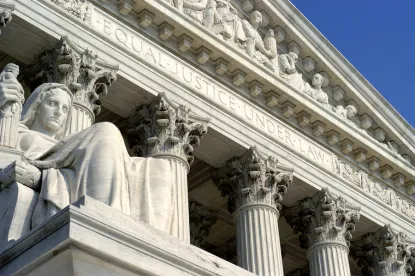The U.S. Supreme Court has once again reinforced its interpretation of the Federal Arbitration Act, ruling on December 14 that a California state law prohibiting class action waivers in arbitration agreements may not trump the Court’s earlier decision in favor of enforcement of arbitration agreements.
In the four years since the Supreme Court’s decision in AT&T Mobility v. Concepcion, which held that the Federal Arbitration Act preempts state laws limiting or declaring unlawful class action waivers in arbitration agreements, many companies have adopted class action waivers in their consumer service agreements. The current case, DirecTV v. Imburgia, involved a service agreement between satellite television provider DirecTV and its customers. The agreement included a binding arbitration clause, which included a class action waiver, but indicated that the waiver would not be unenforceable if the applicable state law (described in the agreement as “the law of your state”) made class action waivers unenforceable.
California law prohibits class action waivers in arbitration agreements (under what is known as the “Discover Bank” rule). DirecTV customers filed a class action lawsuit against the company in California, arguing that the Discover Bank rule precluded DirecTV from seeking to enforce the arbitration agreement, including its class action waiver. In response, DirecTV argued that the Supreme Court’s decision in Concepcion invalidated California’s Discover Bank rule and prevented the court from declaring the class action waiver unenforceable. A California appeals court disagreed, concluding that the reference to “the law of your state” in the agreement allowed the court to consider any state law, even if the law is otherwise preempted by the Federal Arbitration Act.
The Supreme Court reversed the appeal court’s decision in a 6-3 ruling. “The phrase ‘law of your state’ is not ambiguous and takes its ordinary meaning: valid state law,” the Court explained. “The view that state law retains independent force even after it has been authoritatively invalidated by this court is one courts are unlikely to accept as a general matter and to apply in other contexts.”
Although the Supreme Court has been consistent in upholding class action waivers in the consumer context, its decisions are in conflict with the National Labor Relation Board’s take on similar issues in the employment context. The Board has held twice in the past three years that class and collective action waivers in arbitration agreements between employers and employees are not enforceable, as they purportedly run afoul of the guarantee in Section 7 of the National Labor Relations Act that employees may engage in “protected concerted activities.” The Board stands alone in this interpretation; indeed, three federal circuit courts have expressly declined to follow the Board on this point.
In October 2014, the Board decided Murphy Oil USA, Inc., in which it attempted to rehabilitate its previously-rejected decision in D.R. Horton, Inc. The Board stated that the “core objective of the National Labor Relations Act is the protection of workers’ ability to act in concert, in support of one another.” On this general proposition, the NLRB majority again – and in the face of nearly unanimous judicial authority to the contrary – held that employers cannot lawfully agree with employees that employment claims have to be brought individually, in arbitration, and not collectively or by way of a class action lawsuit.
We have earlier noted the Supreme Court’s decision in Concepcion and the conflict presented by the Board’s repeated refusal to recognize federal court decisions on the issue. The Supreme Court ruling in DirecTV further supports that the federal courts will dig in just as hard as the NLRB will on opposite sides of the issue, and deepens the conflict between the interpretation given to arbitration agreements and class action waivers in those agreements under the NLRA, and the interpretation given to such agreements in the consumer context. Until the Supreme Court rules on this issue specifically in connection with an employment arbitration agreement, this tension likely will remain.




 />i
/>i

